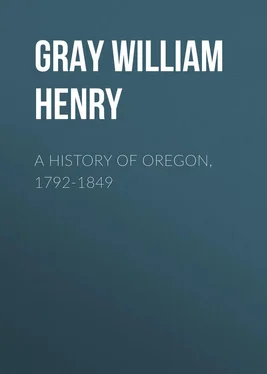William Gray - A History of Oregon, 1792-1849
Здесь есть возможность читать онлайн «William Gray - A History of Oregon, 1792-1849» — ознакомительный отрывок электронной книги совершенно бесплатно, а после прочтения отрывка купить полную версию. В некоторых случаях можно слушать аудио, скачать через торрент в формате fb2 и присутствует краткое содержание. Жанр: literature_19, foreign_antique, foreign_prose, Историческая проза, на английском языке. Описание произведения, (предисловие) а так же отзывы посетителей доступны на портале библиотеки ЛибКат.
- Название:A History of Oregon, 1792-1849
- Автор:
- Жанр:
- Год:неизвестен
- ISBN:нет данных
- Рейтинг книги:5 / 5. Голосов: 1
-
Избранное:Добавить в избранное
- Отзывы:
-
Ваша оценка:
- 100
- 1
- 2
- 3
- 4
- 5
A History of Oregon, 1792-1849: краткое содержание, описание и аннотация
Предлагаем к чтению аннотацию, описание, краткое содержание или предисловие (зависит от того, что написал сам автор книги «A History of Oregon, 1792-1849»). Если вы не нашли необходимую информацию о книге — напишите в комментариях, мы постараемся отыскать её.
A History of Oregon, 1792-1849 — читать онлайн ознакомительный отрывок
Ниже представлен текст книги, разбитый по страницам. Система сохранения места последней прочитанной страницы, позволяет с удобством читать онлайн бесплатно книгу «A History of Oregon, 1792-1849», без необходимости каждый раз заново искать на чём Вы остановились. Поставьте закладку, и сможете в любой момент перейти на страницу, на которой закончили чтение.
Интервал:
Закладка:
By referring to the charter of the Hudson’s Bay Company, we find that it was given by Charles II., in 1670, granting to the “governor and company and their successors the exclusive right to trade, fish, and hunt in the waters, bays, rivers, lakes, and creeks entering into Hudson’s Straits, together with all the lands and territories not already occupied or granted to any of the king’s subjects, or possessed by the subjects of any other Christian prince or State.”
Forty years previous to the giving of this charter by Charles II., of England, Louis XIII., of France, gave a charter to a French company, who occupied the country called Acadia, or New France.
In 1632, Charles I., of England, resigned to Louis XIII., of France, the sovereignty of the country then called Acadia, or New France.
Forty years after Louis XIII., of France, had given his charter, and thirty-eight years after Charles I., of England, had given up his right to the country, Charles II., of England, imitating the example of him who wished to give the world and all its glory to obtain the worship of the Saviour of mankind, gave to the Hudson’s Bay Company what he had not the shadow of a title to, as in the treaty of Ryswick, in 1697, twenty-seven years after this charter of the Hudson’s Bay Company had been given, the whole country was confirmed to France, and no reservation made on account of the Hudson’s Bay Company.
Mr. Fitzgerald, on his 12th page, says: “It has often been asserted, and is to a great extent believed, because there is very little general information on this subject, that the claim which Great Britain made to the Oregon Territory was dependent upon, or, at any rate, strengthened by, the settlement of the Hudson’s Bay Company on the Columbia River .
“Those who hold such an opinion will be surprised to learn that there are many, and they well acquainted with the country itself, who assert that the conduct and policy of the Hudson’s Bay Company in the Oregon Territory formed the chief part of the title which the United States had to the country, which was gratuitously given to her by the settlement of the boundary. What the United States owe to the company for its policy on the west side of the Rocky Mountains is a question to which the English public will some day demand a satisfactory answer.
“Dr. McLaughlin was formerly an agent in the Northwest Fur Company of Montreal; he was one of the most enterprising and active in conducting the war between that association and the Hudson’s Bay Company. In the year 1821, when the rival companies united, Dr. McLaughlin became a factor of the Hudson’s Bay Company. But his allegiance does not appear to have been disposed of along with his interests, and his sympathy with any thing other than British, seems to have done justice to his birth and education, which were those of a French Canadian. This gentleman was appointed governor of all the country west of the Rocky Mountains, and is accused, by those who have been in that country, of having uniformly encouraged the emigration of settlers from the United States, and of having discouraged that of British subjects. While the company in this country (England) were asserting that their settlements on the Columbia River were giving validity to the claim of Great Britain to the Oregon Territory , it appears that their chief officer on the spot was doing all in his power to facilitate the operations of those whose whole object it was to annihilate that claim altogether.”
Mr. Fitzgerald has given us in the above statement an important fact, and one that reveals to an American the deep-laid schemes of the English government, which, by the influence of the Hudson’s Bay Company, sought to secure the Oregon Territory to itself. He also explains the conduct of Dr. McLaughlin in his treatment of emigrants, as well as the relation he sustained to that company. While, as Americans, we can admire and applaud the conduct of a noble and generous “ Canadian-born ” citizen , we at the same time can see the low, debasing, and mean spirit of the Englishman, as manifested in the attempt to deprive the American Republic of its rightful domain.
We shall have occasion to refer to the bringing into Oregon of the Red River settlers, and as the result of that move, the unparalleled effort of Dr. Whitman to defeat the British designs upon the country.
Mr. Fitzgerald explains that matter so well, that we could not do justice to the truth of history not to quote him. He says, on the 14th page of his work: “There is one story told, about which it is right that the truth should be ascertained. It is said that a number of half-breeds from the Red River settlement were, in the year of 1841-2, induced by the company’s officers to undertake a journey entirely across the continent, with the object of becoming settlers on the Columbia River. It appears that a number went, but on arriving in the country, so far from finding any of the promised encouragement, the treatment they received from Dr. McLaughlin was such, that, after having been nearly starved under the paternal care of that gentleman, they all went over to the American settlement in the Wallamet Valley.”
This statement, while it affirms an important fact, gives a false impression as regards Dr. McLaughlin. He, to our certain knowledge, extended to the Red River settlers every facility within his power, and all of those emigrants to this day speak of his kindness in the highest terms. But not so of other leading or controlling members, who really represented the English part and policy of that company. Those settlers complained of the domineering and tyrannical treatment of their English overseers, which was the cause of their leaving what they supposed would eventually be the English part of Oregon Territory. They also became sensible that the Hudson’s Bay Company in Oregon was a different concern from the Hudson’s Bay Company in Rupert’s Land; that, however small their privileges were there, they were less on Puget Sound; and being near an American settlement, they naturally sought its advantages and protection.
Mr. Fitzgerald informs us that “these emigrants became citizens of the United States, and it is further said were the first to memorialize Congress to extend the power of the United States over the Oregon Territory. For the truth of these statements we do not, of course vouch, but we do say they demand inquiry.”
This statement of Mr. Fitzgerald entitles him to be considered a candid and fair writer, and one who is seeking for truth in reference to the subject he is investigating. He has naturally imbibed the feelings of an Englishman against Dr. McLaughlin, under the strong effort made by the English Hudson’s Bay Company to suppress and supersede the French Canadian influence in it.
He says, on page 15: “Dr. McLaughlin’s policy was so manifestly American that it is openly canvassed in a book written by Mr. Dunn, one of the servants of the company, and written for the purpose of praising their system and policy.”
Sir Edward Belcher also alludes to this policy. He says: “Some few years since, the company determined on forming settlements on the rich lands situated on the Wallamet and other rivers, and for providing for their retired servants, by allotting them farms, and further aiding them by supplies of cattle, etc. That on the Wallamet was a field too inviting for missionary enthusiasm to overlook, but instead of selecting a British subject to afford them spiritual assistance, recourse was had to Americans, a course pregnant with evil consequences, and particularly in the political squabble pending, as will be seen by the result. No sooner had the American and his allies fairly squatted (which they deem taking possession of the country), than they invited their brethren to join them, and called on the American government for laws and protection.”
Читать дальшеИнтервал:
Закладка:
Похожие книги на «A History of Oregon, 1792-1849»
Представляем Вашему вниманию похожие книги на «A History of Oregon, 1792-1849» списком для выбора. Мы отобрали схожую по названию и смыслу литературу в надежде предоставить читателям больше вариантов отыскать новые, интересные, ещё непрочитанные произведения.
Обсуждение, отзывы о книге «A History of Oregon, 1792-1849» и просто собственные мнения читателей. Оставьте ваши комментарии, напишите, что Вы думаете о произведении, его смысле или главных героях. Укажите что конкретно понравилось, а что нет, и почему Вы так считаете.












